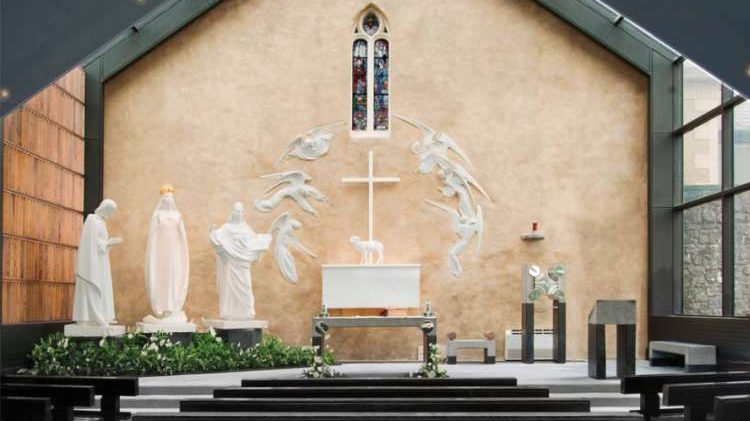Pope Francis will officially designate Knock Shrine in Ireland as an international Marian and Eucharistic shrine on the feast of St. Joseph next week.
The Irish Catholic Bishops’ Conference announced March 11 that the pope will give Knock Shrine official recognition and send a video message to the shrine on the night of March 19.
“This feast of St. Joseph is very appropriate to establish Knock as an international Marian and Eucharistic shrine,” Archbishop Michael Neary of Tuam said as he welcomed the announcement.
The Irish archbishop explained that St. Joseph appeared along with the Virgin Mary in the apparition at Knock in 1879.
On a very rainy August 21, 1879, 15 official witnesses saw an apparition of the Virgin Mary, St. Joseph, St. John the Evangelist, angels, and Jesus Christ (as the Lamb of God) on the south gable of the town church.
For a period of about two hours, a crowd gathered to adore the apparition and to pray the rosary. Despite the rainstorm, the ground around the gable did not get wet.
Unlike in most other Marian apparitions, the Virgin Mary was silent the entire time and did not offer any sort of message or prophecy. Some have theorized that she was silent due to the cultural changes occurring in Ireland at the time -- the oldest of the 15 witnesses could only speak the Irish language, and the youngest, who was only six years old at the time, was being taught only English.
Vatican officials found the apparition at Knock to be “trustworthy and satisfactory” after two separate commissions, in 1879 and 1936.
Pope John Paul II visited Knock in 1979, saying that he was coming “as a pilgrim.” Mother Teresa spoke at the Marian shrine in 1993 about the sacredness of human life of the unborn. And Pope Francis visited in 2018.
The video message from Pope Francis will be played during Mass at the shrine at 7:30 p.m. local time on March 19. The Mass will be offered by Archbishop Neary with Fr. Richard Gibbons, rector of Knock, concelebrating.
“I wish to express my profound gratitude to the Apostolic Nuncio, His Excellency Archbishop Jude Thaddeus Okolo, the Primate of All Ireland Archbishop Eamon Martin, my brother Bishops, the President of the Pontifical Council for promoting the New Evangelization, Archbishop Fisichella, all of whom have been most helpful in securing this recognition for Knock,” Neary said.
This designation comes two years after a miraculous healing involving Eucharistic adoration at Knock Shrine in 1989 was officially recognized by the Vatican.
Marion Carroll, a woman who had been bedridden for years with multiple sclerosis, was healed during a blessing with a monstrance at the shrine.
The shrine’s rector has highlighted that the apparition at Knock has a Eucharistic message because a lamb appeared on top of an altar and in front of a cross.
“The message is Eucharistic .... the Mass is so important. During the penal times, the persecution of Catholics in Ireland, there was a saying, in Irish. The saying was ‘For the Irish, it is the Mass that matters.’ So the Mass maintained the faith of the people during very, very bad times,” Gibbons told EWTN in 2020.
The apparition at Knock took place amid a famine year in northwest Ireland.
Following the Great Famine of 1845-1849, a potato famine that devastated Ireland and resulted in the deaths of an estimated one million people, recurring famines struck Ireland in the decades that followed, particularly in the northwest.
The Knock Shrine was built on the site of the 1879 apparition and today is a pilgrimage site where thousands came annually before the coronavirus pandemic to find spiritual healing and peace.
On average, 4,000 confessions took place each week at the shrine before the pandemic, according to the rector.
“At Knock, people come to confession all the time. I call it our engine room -- that’s where the miracles happen and the dynamic happens -- in the confessional,” Gibbons said.
“People that come to Knock wouldn’t even think about going to confession, but they see others going ... it gives them such peace and hope and joy that they in turn then speak that to other people.”
“It is a place of hope, a place of peace, and a place of reconciliation. That is what Knock offers to people,” he said.

